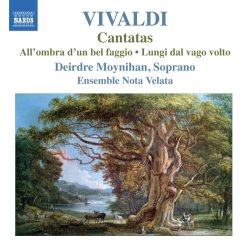| 
|
Antonio VIVALDI (1678 - 1741)
Cantatas
Lungi dal vago volto (RV 680) [13:41]
Allor che lo sguardo (RV 650) [09:25]
Che giova il sospirar, povero core (RV 679) [10:43]
All'ombra d'un bel faggio (RV 649) [09:54]
Perché son molli (RV 681) [11:19]
Deirdre Moynihan (soprano)
Ensemble Nota Velata (Claire Duff, Anita Vedres (violin), Marja Gaynor (viola), Aoife Nic Athlaoich (cello), David Adams (harpsichord))
rec. 13-15 December 2012, Beechpark Studios, Co. Dublin, Ireland. DDD
Texts and translations included
NAXOS 8.573003 [55:04]
The chamber cantata was one of the most popular forms of musical entertainment in the baroque era in Italy. Such pieces were often performed in the 'academies' which were held in the palaces of the aristocracy in Rome and elsewhere. The repertoire reflects the 'Arcadian' world which is dominated by shepherds and shepherdesses. The latter frequently turn up in cantatas which were mostly scored for solo voice and basso continuo, sometimes with additional parts for one or two treble instruments. Alessandro Scarlatti (1660-1725) was one of the first to compose chamber cantatas, and he laid the foundation of the genre as far as its form is concerned. Most cantatas comprised two arias embracing a recitative. This basic structure could be extended by, for instance, an introductory recitative or an extra recitative-aria pair.
Cantatas were written for domestic entertainment. However, some were quite virtuosic, and could be used as vehicles for singers to show their skills. They also have a strong connection with opera: some cantatas have such a dramatic character that they are almost pocket-size operas. The dramatic traits need to be communicated to the audience. For this reason the performance of such cantatas can be quite demanding, and it is not without risk to choose such repertoire for a debut disc as is the case here.
It is one of the virtues of this disc that Deirdre Moynihan has largely avoided the best-known cantatas. Some of Vivaldi's cantatas are very popular and regularly performed and recorded. One of them is Lungi dal vago volto; the other cantatas on the programme are not that well-known. The content shows some similarity as they are all about the trials and tribulations of love. Even so, there is quite some difference in content. Additional variety is created by the differences in scoring. Allor che lo sguardo and All'ombra d'un bel faggio are for voice and basso continuo, Lunga dal vago volto has a violin part, Perché son molli has parts for two violins (which also participate in the only recitative), whereas in Che giova il sospirar the two violins are joined by a viola.
This disc offered me the first opportunity to hear Deirdre Moynihan sing, and I liked what I heard. She has a beautiful voice, which is perfectly suited to baroque music. I liked her stylish ornamentation and I also noted with satisfaction her awareness that recitatives should be performed with quite some rhythmic freedom. The fact that she largely avoids an incessant and unstylish vibrato is also something to be happy about, especially as I have heard many specimens of the opposite lately. However, I believe that more is needed for a truly convincing performance of this repertoire.
Ms Moynihan takes some liberties in the recitatives, but doesn't go far enough. They give the impression of being rather rushed: there are various words and phrases which need more attention, and a singer should take time for that. A phrase like "Thyrsis, slow of step" (All'ombra d'un bel faggio) could be illustrated by a slowing down of the tempo. Words like "pianto" and "dolor" need more attention through a varied colouring of the voice and dynamic shading. Even in arias there are opportunities for a variation in tempo at the service of text expression. Too often Ms Moynihan is just too cautious, maybe even afraid of taking liberties which are perfectly acceptable and can serve to underline the dramatic aspects. Her ornamentation is stylish, and I am glad that she avoids the aberrations in some recordings where singers take the freedom almost completely to rewrite lines in the dacapos. However, I would have liked more variety in the ornamentation. I have heard too much of the same here. Lastly, Ms Moynihan has a clear and penetrating upper register. The lower part of her tessitura is far less well developed - as the aria 'Nell'aspro tuo periglio' (Che giova il sospirar) shows. In the A part of this aria the long notes require more dynamic shading.
These issues indicate that there is room for improvement. I am happy to say that the foundation of Ms Moynihan's singing is healthy, both technically - as far as I can judge - and stylistically. That is why I have enjoyed this disc. Those things which are lacking should all come with time and experience. I am sure that she will also add some dark and sharp edges to her voice, giving her the opportunity to explore the theatrical aspects of the repertoire more extensively.
Deirdre Moynihan is certainly a singer to keep an eye on. I am curious to know how she will develop. Despite some shortcomings she has made a good start with this disc, also thanks to the contributions of the fine Ensemble Nota Velata.
Johan van Veen
http://www.musica-dei-donum.org
https://twitter.com/johanvanveen
 |
 |
|



 All Nimbus reviews
All Nimbus reviews








